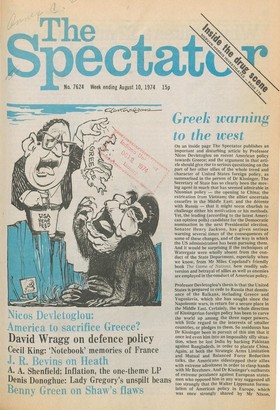Greek warning to the west
On an inside page The Spectator publishes an important and disturbing article by Professor Nicos Devletoglou on recent American policy towards Greece; and the argument in that article should give rise to serious questioning on the part of her other allies of the whole trend and character of United States foreign policy, as summarised in the person of Dr Kissinger. The Secretary of State has so clearly been the moving agent in much that has seemed admirable in Nixonian policy — the opening to China; the extrication from Vietnam; the albiet uncertain ceasefire in the Middle East; and the detente with Russia — that it might seem churlish to challenge either his motivation or his methods. Yet, the leading (according to the latest American opinion polls) candidate for the Democratic nomination in the next Presidential election, Senator Henry Jackson, has given serious warning several times of the consequences of some of these changes, and of the way in which the US administration has been pursuing them. And it would be surprising if the techniques of Watergate were wholly absent from the conduct of the State Department, especially when we know, from Mr Miles Copeland's friendly book The Game of Nations, how readily subversion and betrayal of allies as well as enemies are employed in the conduct of American policy.
Professor Devletoglou's thesis is that the United States is prepared to cede to Russia that dominance of the Balkans, including Greece and Yugoslavia, which she has sought since the Napoleonic wars, in return for a secure place in the Middle East. Certainly, the whole direction of Kissingerian foreign policy has been to carve the world up among the three super powers, with little regard to the interests of smaller countries, or pledges to them. So assiduous has Dr Kissinger been in pursuit of this aim that it once led even him into an impossibly silly situation, when he lost India by backing Pakistan against Bangladesh, in order to placate China. Again, at both the Strategic Arms Limitation and Mutual and Balanced Force Reduction talks, the Americans sidestepped their allies with extreme adroitness in order to clasp hands with Mr Brezhnev. And Dr Kissinger's outbursts of extreme petulance against European statesmen who opposed him in any way suggested all too strongly that the Walter Lippmann formulation of American policy in Europe, which was once strongly shared by Mr Nixon,
































